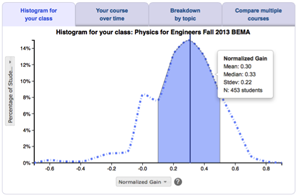
Paradigms in Physics
Developed by: Oregon State University Physics Department
Level










middle schoolhigh schoolintro collegeinter-mediateupper levelgrad school other


middle schoolhigh schoolintro collegeinter-mediateupper levelgrad school other
Topics












Setting












Overview
What? Activities for upper-level physics including kinesthetic activities, computer simulations, integrated whiteboarding, and other small group activities. Can be incorporated into a standard course, or used as part of a restructuring of the undergraduate curriculum.
Student skills developed
Designed for:
- Conceptual understanding
- Problem-solving skills
- Lab skills
- Making real-world connections
- Using multiple representations
Can be adapted for:
- Metacognition
Instructor effort required
- High
Resources
Developer's website: Paradigms in Physics
Teaching Materials
You can download activities, activity sequences, homework problems, and teaching tips for free from the Paradigms in Physics curricular materials website.
Research
RESEARCH VALIDATION
This is the third highest level of research validation, corresponding to:
- at least 1 of the "based on" categories
- at least 1 of the "demonstrated to improve" categories
- at least 1 of the "studied using" categories
Research Validation Summary
Based on Research Into:
- theories of how students learn
- student ideas about specific topics
Demonstrated to Improve:
- conceptual understanding
- problem-solving skills
- lab skills
- beliefs and attitudes
- attendance
- retention of students
- success of underrepresented groups
- performance in subsequent classes
Studied using:
- cycle of research and redevelopment
- student interviews
- classroom observations
- analysis of written work
- research at multiple institutions
- research by multiple groups
- peer-reviewed publication
References
- D. Demaree, Applying ISLE Ideas to Active Engagement in the Spins Paradigm, presented at the Physics Education Research Conference 2010, Portland, Oregon, 2010.
- P. Emigh, E. Gire, C. Manogue, G. Passante, and P. Shaffer, Research-based quantum instruction: Paradigms and Tutorials, Phys. Rev. Phys. Educ. Res. 16 (2), 020156 (2020).
- I. Founds, P. Emigh, and C. Manogue, Student responses to chain rule problems in thermodynamics, presented at the Physics Education Research Conference 2017, Cincinnati, OH, 2017.
- E. Gire and C. Manogue, Resources Students Use to Understand Quantum Mechanical Operators, presented at the Physics Education Research Conference 2008, Edmonton, Canada, 2008.
- E. Gire and C. Manogue, Making sense of quantum operators, eigenstates and quantum measurements, presented at the Physics Education Research Conference 2011, Omaha, Nebraska, 2011.
- M. Kustusch, C. Manogue, and E. Price, Design tactics in curriculum development: Examples from the Paradigms in Physics ring cycle, Phys. Rev. Phys. Educ. Res. 16 (2), 020145 (2020).
- C. Manogue, L. Cerny, E. Gire, D. Mountcastle, E. Price, and E. van Zee, Upper-Division Activities That Foster “Thinking Like A Physicist”, presented at the Physics Education Research Conference 2010, Portland, Oregon, 2010.
- C. Manogue and E. Gire, Cognitive Development at the Middle-Division Level, presented at the Physics Education Research Conference 2009, Ann Arbor, Michigan, 2009.
- C. Manogue, E. Gire, D. McIntyre, and J. Tate, Representations for a spins-first approach to quantum mechanics, presented at the Physics Education Research Conference 2011, Omaha, Nebraska, 2011.
- C. Manogue, E. Gire, and D. Roundy, Tangible Metaphors, presented at the Physics Education Research Conference 2013, Portland, OR, 2013.
- C. Manogue, P. Siemens, J. Tate, K. Browne, M. Niess, and A. Wolfer, Paradigms in Physics: A new upper-division curriculum, Am. J. Phys. 69 (9), 978 (2001).
- E. van Zee and C. Manogue, Documenting and Interpreting Ways to Engage Students in ‘Thinking Like a Physicist’, presented at the Physics Education Research Conference 2010, Portland, Oregon, 2010.
- J. Zwolak and C. Manogue, Assessing student reasoning in upper-division electricity and magnetism at Oregon State University, Phys. Rev. ST Phys. Educ. Res. 11 (2), 020125 (2015).




